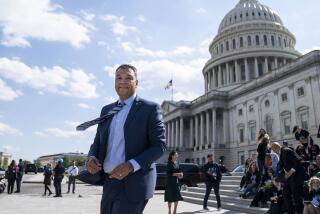Schwarzenegger Sketches Out Plans for Reform
Arnold Schwarzenegger on Thursday offered a few new proposals on California’s workers’ compensation system and the state budget while admitting he made a mistake in suggesting that he would not accept contributions for his bid for governor.
During a news conference in Riverside, Schwarzenegger said he misspoke in declaring early in his campaign that he was “not taking money from anyone;” he said it had always been his intention to raise campaign funds but he simply wanted to avoid taking money from special interests. He also announced the return of a $2,500 donation from the Assn. for Los Angeles Deputy Sheriffs because his campaign has a policy of not accepting union money.
“It was my mistake because I was not articulate enough to explain that,” he said of his fund-raising policy. Of the returned donation, he added: “We realized this was a conflict of interest.”
Schwarzenegger struggled to explain what makes unions and Indian tribes -- from which he pledges not to accept funds -- different from the real estate, Hollywood and other business interests that have donated to his campaign.
“I don’t want to accept any money from people I potentially would be negotiating with” as governor, he answered.
In a 25-minute interview after the news conference, Schwarzenegger laid out the skeleton of a plan to reform the troubled workers’ compensation system, proposed a rainy day fund for the state budget, and warned that California could again face power shortages by 2006 if more power plants were not built.
To lower the cost to employers of carrying workers’ compensation insurance, the state must make it harder to file lawsuits, define work-related disabilities more clearly to prevent abuse and fraud, and set up clear-cut utilization schedules that would define when injured workers could see doctors, Schwarzenegger said.
“Don’t we have a real rule here, a specific thing, a certain standard like other places have?” Schwarzenegger asked rhetorically. “The whole system has to be reformed.”
On energy, in response to a question about how he would fulfill his promise to reduce electricity rates, Schwarzenegger criticized the state government for facilitating only a fraction of the new power plants promised during the energy crisis. He said the state’s poor business climate was discouraging investment in new plants. He cautioned that electricity reserves could soon dip, putting the state in danger of more blackouts.
At one point, Schwarzenegger sought to link energy and the budget, saying California needs to establish reserves in both areas in case of emergency.
“I believe that when it comes to the budget, when we have revenues again that go up, we have to keep a certain amount of money for a rainy day,” he said. “It’s the same thing with energy.”
Schwarzenegger met with reporters from The Times, the (Riverside) Press-Enterprise and Associated Press. The interviews -- which were limited to about 20 minutes by the campaign -- were his first one-on-one sessions with print reporters during the campaign. They appeared to be aimed in part at answering criticism that Schwarzenegger was avoiding California’s print media.
“You can’t say that anymore,” spokesman Sean Walsh said.
While offering a few more hints of his plans, Schwarzenegger continued to eschew details and speak in broad themes while sprinkling in stories from his life and travels.
Details, he said on more than one occasion, would have to wait until he understood the exact scope of the state’s budget problems.
Asked whether he would have to cut health care because of his promise to protect education, he said he couldn’t identify cuts “until I see the detailed figures.” He deflected a question about what services he might deny undocumented immigrants, saying that a federal court had already decided the issue in ruling Proposition 187 unconstitutional. The proposition sought to limit public benefits to illegal immigrants.
On education, he expressed support for the state’s system of testing students, and he pledged his love for Proposition 98, which requires about 40% of the state’s general fund to be spent on education.
In response to a question of whether he would be willing to delay Proposition 98 funds to balance the budget, as some legislators proposed this year, Schwarzenegger replied: “There are certain fundamental things, I would just say, not over my dead body.”
In the Times interview, Schwarzenegger elaborated slightly on fund-raising, saying he has been making such calls late in the day as part of his regular campaign duties.
“I have to say it’s the thing I dislike the most,” he said. “All my life I tried to make money so I didn’t have to ask anybody for anything. All of a sudden, there you are, ‘Can you help me with this?’ ”
He was careful to add that most of his campaign funds come from himself and his wife, and suggested that accepting donations was an obligation because “there are so many people who want to support my campaign.”
But he also went out of his way to declare his personal desire to be governor, saying he had “fire in the gut.”
“You know what I found boring was sitting on a movie set after 25 years,” he told The Times. “Now I’m excited again. I just love it. I love getting up in the morning. It’s new. It’s different. It’s challenging. It’s risky, which is of course what I love.... My wife said to me, ‘I haven’t seen you this excited in a long time.’ ”
Before spending the afternoon with reporters, Schwarzenegger delivered a three-minute speech calling on people to register to vote by the Sept. 22 deadline. Police estimated the crowd at 1,500.
More to Read
Get the L.A. Times Politics newsletter
Deeply reported insights into legislation, politics and policy from Sacramento, Washington and beyond. In your inbox three times per week.
You may occasionally receive promotional content from the Los Angeles Times.






